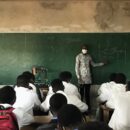Distortion, Destitution and Deforestation
Brendan Bromwich & Margie Buchanan-Smith

This report by the UN Environment Programme highlight the impact of displacement and rapid urbanisation on the natural resources of Darfur, specifically on water resources and forestry. The work is driven by the recognition that Darfurians are dependent on natural resources for their basic needs and livelihoods.
“Destitution, distortion and deforestation” examines the trade and markets in timber and woodfuel. The report highlights:
“¢ How IDPs from one large camp used to be able to access firewood 15 km away. Now they must travel 75 km
“¢ Driven by a construction boom, brick production has risen 4 to 5 times pre-conflict levels and uses more than 57,000 trees-worth of firewood per year for firing in brick kilns, much of which is greenwood
“¢ There has been a three-fold increase in the number of sawmills since before the conflict.
The conflict has led to a distorted process of urbanization, fuelled by massive displacement, and the large and unprecedented presence of the international community as they respond to the humanitarian crisis. Property rather than livestock is now the preferred form of investment for Darfurians with resources. The report concludes that the use of firewood in the brick kilns is the most damaging cause of deforestation, followed by timber for construction. While brick-making is having the most extensive impact in terms of deforestation, the (often illegal) felling of hardwoods for furniture is probably having greatest impact in terms of the destruction of particular species such as mahogany and gimbeel. Firewood for domestic purposes uses dead wood; thus, it is not a direct cause of deforestation, but retreating forest resources around urban areas increases the vulnerability of those dependent on firewood collection. Although the overall message from this study is a pessimistic one, there are sparks of hope. Concern about deforestation and willingness to reverse the trend are widespread, and there is growing collaboration between the International community and Darfurian organisations in seeking solutions, in particular the introduction of alternative construction and energy technologies.
This report relied heavily on Darfurian experts and form part of a broad programme of analysis intended to support humanitarian programming appropriate to the complex social and environmental context in Darfur.
For further information and other UNEP reports on Sudan see the UNEP Sudan web page.





